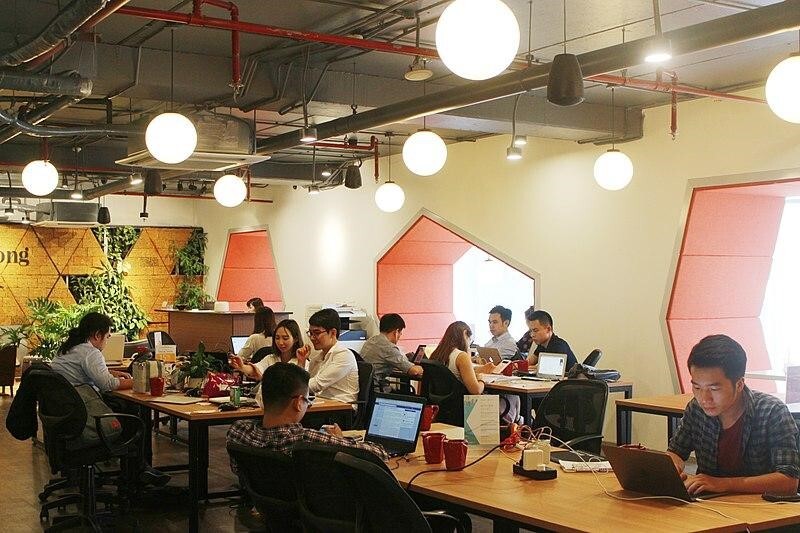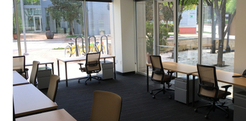Some argue that the rapid developments the Information Age were seeing up until January 2020 have come to a standstill because of the Coronavirus lockdown. While it is true that development has stopped significantly, saying that it has come to a standstill isn't completely true.
Businesses have now ushered in a new era of telework and social distancing, forcing large and small businesses to see that work from home is a very viable option. It cuts down overhead costs significantly. And as things start getting better, business places might not be the same anymore.
Coworking spaces like these will see a major uptick because of this, as businesses will try cutting down costs further to make up for lost revenue in the months lost under lockdown. Small businesses will rush towards this opportunity even more fiercely as shared desks and rented executive office suites will help them reduce overheads for months to come says Jason Bowers CEO of Dallas Coworking Expert.
This means that the idea of shared office spaces will be a lifeline for small businesses after the COVID-19 lockdown, helping them get back on their feet. Until they get a steady revenue stream again, they might not even consider the idea of owning or renting dedicated desks or spaces.
There are three main arguments that make us come to this conclusion:
1. Giving Place to Remote Workers
As small businesses try to grasp every cost-saving avenue they can, it is likely that they won’t actually open up their own business places because of the immense overheads that come with them. In fact, they will push towards “embracing telework.”
The idea has found roots because of Tulsa Remote, a program that pays people working remotely in Tulsa, Oklahoma. One of the most important factors that come into play here is coworking spaces. They have hosted many remote workers work for Tulsa Remote.
While in the beginning, the idea of working from home was an unwelcomed one - with so many distractions around the house, the COVID-19 situation was nothing short of a nightmare. However, people are now starting to get comfortable with the idea. Perhaps not working in their own home, but the idea of remote work.
As months pass, people are starting to become eager to work anywhere else. And small businesses can use that to their advantage via shared office spaces.
2. Resource Coordination
For small businesses operating on the ”periphery” of local economies, coworking spaces are nothing short of lifesavers. These are the companies that have suffered most from the lockdown.
Companies offering non-essential physical services or other services that require extensive teamwork, coupled with being in the lower spectrum of revenue or profitability will take any chance they can to get their workforce back to work.
The US of Commerce recognizes small businesses struggling for money and has offered business loans during the coronavirus, as part of the CARES ACT. Unfortunately, these peripheral businesses are just on the verge of profitability, meaning they will have a hard time funneling their resources through this Act.
These businesses are usually in contact with such businesses and are therefore well-positioned to help businesses get direct assistance from local emergency relief funds. In fact, fund managers usually get in touch with shared working owners first to ask about businesses that might need said relief.
3. Recovery of the Economy
Over the span of just a decade, co-working spaces grew by more than 1,000%. This doesn’t just reflect the number of coworking spaces out there but also the number of people working in them. In 2019, there were 2.17 million workers sharing desks. While the same was projected to increase to 2.68 million in 2020.
One of the main reasons for this exponential growth? Lower running and maintenance costs.
With so many people working in shared spaces, it is natural to assume that they play an important role in helping the economy get back on its feet. To ensure that the economy rebounds properly, government officials as well as high-level business executives might actually give these spaces a chance.
This chance could be in the shape of grants or permission to open early on after the COVID-19 situation in order to tackle the “decay in organizational capital” caused by the lockdown.
When the COVID-19 lockdown ends, nothing will be like it was. Just because the lockdown is over, it might not mean that everything will be back to normal. Unfortunately, the pandemic has found roots deeper than a ‘flick of the switch’ in our social and economic lives.
Some small businesses might not be in a position to reopen. Their reduced profitability or the outright lack of a revenue stream might mean that entrepreneurial dreams will be shattered. That’s where a co-working space and its reduced operational expenses will come into play, serving as a lifeline for these businesses.
As owners struggle to regain the lost capital, pay off loans and more, a shared co-working space might be the best option they are left with.
This news has been published for the above source. Kiss PR Brand Story Press Release News Desk was not involved in the creation of this content. For any service, please contact https://story.kisspr.com.







